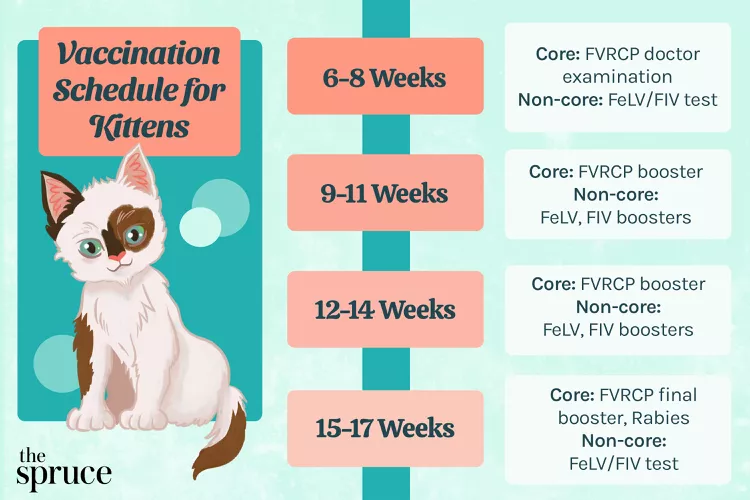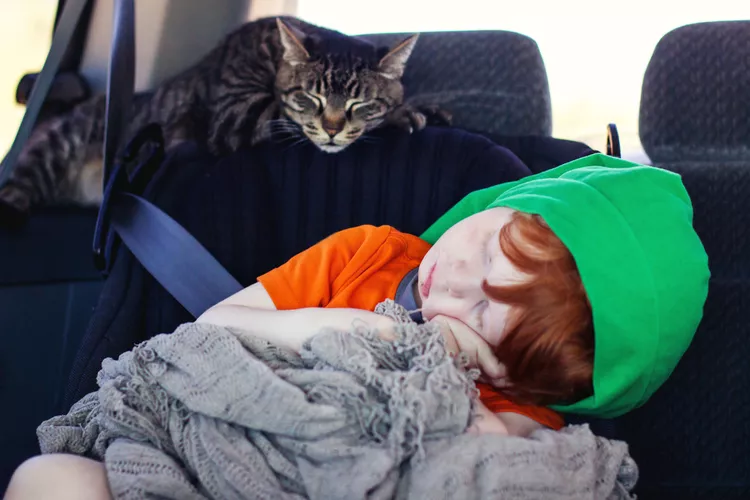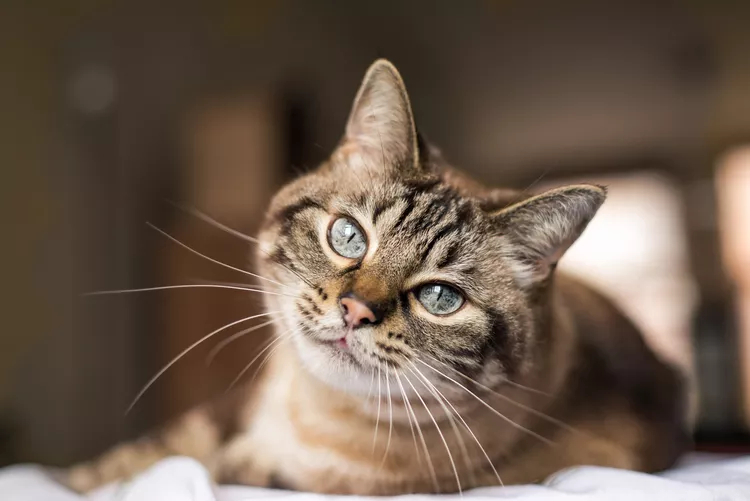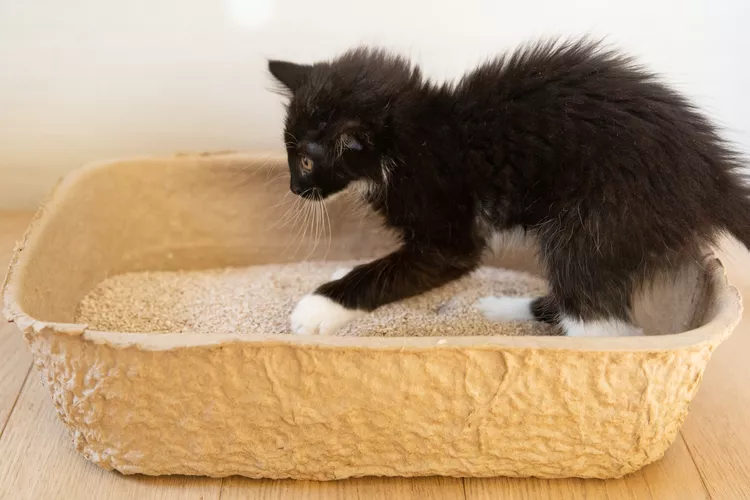
Your new kitten deserves the best start in life, and this means providing everything she needs to grow and stay healthy. Kitten vaccines are essential to prevent your kitten from getting sick and avoid the spread of disease. Here are the vaccines your kitten may need and the typical kitten vaccine schedule recommended by veterinarians.
Kittens need vaccines to protect them from certain serious diseases. A vaccine is designed to trigger an immune response and prevent future infection from that disease.
When kittens are born, their immune systems are not fully developed and they are unable to fight disease on their own. Fortunately, nursing mothers provide antibody-rich milk called colostrum that gives kittens temporary immunity against illness. The length of this immunity varies from kitten to kitten, but protection from maternal antibodies generally fades within a few weeks.
There is no easy way to know exactly when a kitten is vulnerable to a specific disease. In an effort to protect kittens from diseases, veterinarians administer vaccinations at strategic intervals.
Fortunately, a vaccine injection itself is typically not very painful. Your kitten may feel a little pinch or sting, but many do not notice at all. Plus, many vets use treats or toys to distract the kitten and make the experience more fun.
Certain vaccines provide immunity against the most dangerous and widespread diseases. Veterinarians call these core vaccines, and they're considered essential for all kittens and adult cats, regardless of lifestyle or location.
Non-core vaccines are recommended for cats and kittens who may be exposed to certain diseases due to geographical locations or an outdoor lifestyle. Your veterinarian can help you decide if your kitten needs any non-core vaccines.
Kittens receive a series of vaccines over an 8- to 12-week period beginning at between 6 and 8 weeks of age. Boosters of some vaccines are given about three to four weeks apart until approximately 16 to 20 weeks of age.
At your kitten's first veterinary exam, your veterinarian will discuss a vaccine schedule as well as other treatments, such as deworming and beginning parasite prevention. Some vaccines might be given together in one injection which is called a combination vaccine.
At the first vaccine visit, your veterinarian will do an examination before vaccinating your kitten. Vaccines should never be given to a kitten with a fever or illness as the vaccine will not be effective. Giving a vaccine to a sick kitten can actually make her feel worse.
It takes about seven to 10 days for a vaccination to become effective, and some need to be repeated in three to four weeks. However, kittens with remaining maternal antibodies for that disease will not be affected by the vaccine. Since there is no way to be certain if a kitten still has maternal antibodies, boosters are necessary. True immunity is uncertain until about 16 to 18 weeks of age, or until all kitten boosters are completed. Avoid exposing your kitten to unknown animals until all vaccinations have been given.
Rabies is a fatal virus that can affect cats as well as humans. This is a core vaccine that is generally required by law because of how serious this disease is. All kittens and adult cats should be vaccinated against rabies. Most vets recommend giving this vaccine around 16 weeks of age and repeating it every one to three years.
FVRCP stands for feline viral rhinotracheitis, calicivirus, and panleukopenia. This is a core vaccine considered essential for all kittens; it's generally given at 6 to 8 weeks of age and repeated every three to four weeks until around 16 weeks of age.
Calicivirus and rhinotracheitis are common feline viruses known to cause upper respiratory infections in cats. Panleukopenia, commonly referred to as feline distemper, is a highly contagious and often fatal disease that attacks rapidly growing and dividing cells like those in the intestines, bone marrow, and the developing fetus.
FeLV or feline leukemia virus is a vaccine that is considered non-core in low-risk adult cats but is often considered core for all cats less than a year old. Adult cats who will spend time outdoors should get this vaccine booster annually. Kittens typically get their first FeLV vaccine between 9 and 11 weeks of age, and then a booster three to four weeks later.
Feline leukemia is one of the most common infectious diseases in cats. It is spread most commonly through social contact with infected cats. FeLV can cause a variety of health issues in cats, including cancer and immune system disorders.
FIV stands for feline immunodeficiency virus, a common feline virus spread most commonly by bite wounds. This vaccine is no longer available in North America. It was considered non-core and recommended only for cats at a very high risk of exposure to FIV. Though many FIV-positive cats can live normal lives, those adversely affected will suffer from various illnesses due to immune system dysfunction.
Every veterinarian has certain preferences about the order and frequency of additional procedures such as examinations, deworming, and testing. Talk to your vet about the best schedule for your kitten.
Although there are some risks associated with vaccinations, they are relatively uncommon. Vaccine reactions and side effects are typically minor and often go away on their own. These may include pain and swelling at the injection site, lethargy, or a mild fever.
Some cats will experience an allergic reaction to ingredients in the vaccine. Severe allergic reactions are uncommon but can be fatal if left untreated. If your kitten develops hives, facial swelling, vomiting, diarrhea, or difficulty breathing, go to the nearest open vet immediately. Mild reactions may resolve on their own, but call your veterinarian to report any signs just to make sure.
Feline injection site sarcomas have been associated with vaccinations and other injections in cats. These tumors are rare and the cause of their formation is not fully understood. While a small knot developing at a vaccination site is a common and mild reaction, any mass at an injection site should be evaluated by a veterinarian if it lasts more than three months, is more than two centimeters in size, or gets larger more than a month after vaccination. Vaccines are now commonly given low on the limbs (below the elbow or knee) so the limb can be amputated if a tumor develops.
Because vaccinations stimulate the immune system, there is a slight risk of developing an autoimmune disorder. This is extremely uncommon when you consider the numbers of pets affected versus all the pets that are vaccinated. However, autoimmune disorders can be serious and difficult to treat. Illnesses that may occur include blood disorders, neuromuscular issues, and even skin problems.
Most veterinarians and pet experts agree that the benefits outweigh the risks when it comes to vaccines, especially for young animals. When it comes to adult cat vaccines, many vets are embracing protocols that vaccinate less often. Once given annually, many adult vaccinations are now more likely to be recommended every three years. However, it's still important to visit the vet forroutine check-ups, which are typically recommended annually.
Depending on your location, kitten vaccination may cost around $300 for the first year, give or take. If you've adopted your kitten group, it should come partially vaccinated, depending on its age, and that cost is part of your adoption fee. (Please note: adopting kittens this way is a great way to both save a life, and save some cash!)
After the initial kitten series of rabies vaccines, cats may need to be vaccinated every one to three years for rabies. The frequency depends on your state's laws and the availability of three-year feline rabies vaccines.
Rabies, feline panleukopenia (feline distemper), feline herpesvirus, feline calicivirus, and feline leukemia (FeLV) can all be prevented with vaccination.

212 Hairless Cat Names For Your Beautifully Bald Feline
Discover the perfect name for your hairless cat with our list of over 200 creative and unique names. From quirky to classic, find a fitting choice for your beautifully bald feline companion.
8 Things Your Cat Loves
Just like humans, cats can have a long list of things they like. Find out what cats love so you can keep your cat happy and healthy.
How to Tell If a Kitten is a Boy or a Girl
If you're wondering whether your new kitten is a boy or a girl, here are three ways to help determine the sex of your cat.
8 Tips to Help Cats Enjoy Car Travel
Cats are creatures of habit, and they hate to travel. Learn tips to prepare them for travel in the car, whether going to the vet or on vacation.
Common Causes of Mucus in Dog Poop
Seeing mucus in your dog's poop can be concerning to a dog owner. Here are common causes and treatment of mucus in a dog's stool.
Is Shrimp Bad For Dogs?
Shrimp can be a healthy, nutritional food for people but can dogs eat them, too? What are the main concerns with feeding shrimp to your dog?
Can Dogs Eat Grapes?
Are grapes safe for dogs? Grapes and raisins can cause serious toxicity in dogs. Find out what to do if your dog eats grapes.
Maine Coon Cat: Breed Profile, Characteristics & Care
The Maine Coon cat is of the largest cat breeds in the world. These amiable, gentle cats make great companions. Learn about the Maine Coon cat breed's appearance, temperament, health, and care needs.
Selkirk Rex: Cat Breed Profile, Characteristics & Care
The Selkirk Rex is a charming cat with a tousled coat and a loving, laid-back personality. Learn about the Selkirk Rex breed.
How to Stop Your Cat From Chewing Electrical Cords
Cats are known to pounce and attack inanimate objects, like electrical cords. Learn how to prevent your cat from ambushing objects that may harm it.
What Do Cats Think About?
Have you ever wondered what cats think about? A number of studies have explored cat behavior and feline cognition, but there's still more to learn.
Training Your Kitten to Use the Litter Box
Bringing home a new kitten means they need to learn how to properly use a litter box. Discover how to successfully litter box train your kitten.
Why Do Cats Knead?
Kneading is a common behavior in cats of all ages. Learn why cats "make biscuits" and what it means for you, your cat, and all your blankets.
Dandie Dinmont Terrier: Dog Breed Characteristics & Care
Learn about the Dandie Dinmont Terrier, a silky dog breed with a signature puff of hair atop its head and a friendly, companionable personality.
Tibetan Mastiff: Dog Breed Characteristics & Care
Learn about the Tibetan mastiff, an ancient guardian dog breed. This breed is known for their massive stature, flowing mane, and protective personality.
4 Reasons Why Your Dog Licks Their Butt
Butt-licking in dogs can be a part of normal grooming, but excessive butt-licking is not normal. Read about the most common reasons for this behavior.
How to Teach Your Dog the "Leave It" Command
Training your dog the "leave it" command is a great way to instill self-control. Learn how to teach your dog to not pick things up from the ground.
How to Solve Your Dog's Fear of Car Rides
Is your dog scared of car rides? This fear of riding in cars is common. Learn why your dog is scared of car rides and how to help conquer this fear.
Can Dogs Get Depression? How to Help Your Sad Dog
Can dogs get depression? Learn about the signs of depression in dogs and find out how to help your sad dog.
How to Play Tug of War With Your Dog
Many dogs love to play tug of war, and it's a healthy game that provides great exercise. Learn the best way to safely play tug of war with your dog.